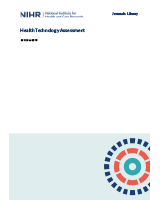This work was produced by Kyle et al. under the terms of a commissioning contract issued by the Secretary of State for Health and Social Care. This is an Open Access publication distributed under the terms of the Creative Commons Attribution CC BY 4.0 licence, which permits unrestricted use, distribution, reproduction and adaption in any medium and for any purpose provided that it is properly attributed. See: https://creativecommons.org/licenses/by/4.0/. For attribution the title, original author(s), the publication source – NIHR Journals Library, and the DOI of the publication must be cited.
NCBI Bookshelf. A service of the National Library of Medicine, National Institutes of Health.
Kyle SD, Bower P, Yu LM, et al. Nurse-delivered sleep restriction therapy to improve insomnia disorder in primary care: the HABIT RCT. Southampton (UK): National Institute for Health and Care Research; 2024 Aug. (Health Technology Assessment, No. 28.36.)

Nurse-delivered sleep restriction therapy to improve insomnia disorder in primary care: the HABIT RCT.
Show detailsTABLE 35
Treatment effect for those completing the primary outcome (ISI) at 6 months pre vs. during the COVID-19 pandemic
| SRT (N = 321) | SH (N = 321) | Adjusted treatment difference (95% CI)a | Test of interaction (p-value)b | |
|---|---|---|---|---|
| ISI at 6 months, mean (SD) (N) | ||||
| 6-month follow-up assessment completion c | 0.420 | |||
| Pre-pandemic | 10.9 (5.82) (155) | 14.2 (5.15) (180) | −3.31 (−4.30 to −2.32) | |
| During pandemic | 10.9 (5.04) (102) | 13.4 (5.34) (111) | −2.65 (−3.90 to −1.41) | |
- a
- b
Level of significance = 0.05.
- c
Linear mixed-effects model with an unstructured variance–covariance structure for the random effects, modelled against group, outcome score at baseline, minimisation factors (baseline ISI score, region, age, use of prescribed sleep-promoting medication, sex and baseline PHQ-9 score), assessment time point, an indicator variable for if the participant’s 6-month assessment time point was (or would have been, if the participant withdrew or was lost to follow-up) before or after the UK went into a national lockdown (23 March 2020), and an interaction between randomised group, assessment time point, and the pandemic indicator variable as fixed effects; GP practice as a random effect, and a random intercept for each participant.
- Results for pre versus during pandemic - Nurse-delivered sleep restriction thera...Results for pre versus during pandemic - Nurse-delivered sleep restriction therapy to improve insomnia disorder in primary care: the HABIT RCT
- Outcome descriptions - An intervention to improve the quality of life in childre...Outcome descriptions - An intervention to improve the quality of life in children of parents with serious mental illness: the Young SMILES feasibility RCT
- Unit cost of services - START (STrAtegies for RelaTives) study: a pragmatic rand...Unit cost of services - START (STrAtegies for RelaTives) study: a pragmatic randomised controlled trial to determine the clinical effectiveness and cost-effectiveness of a manual-based coping strategy programme in promoting the mental health of carers of people with dementia
- Process evaluation framework categories and codes - Nurse-delivered sleep restri...Process evaluation framework categories and codes - Nurse-delivered sleep restriction therapy to improve insomnia disorder in primary care: the HABIT RCT
- Information regarding exposure to antibiotics according to centre and severe adv...Information regarding exposure to antibiotics according to centre and severe adverse events in the two intervention arms classified according to MedDRA preferred term and actions taken regarding the trial interventions - A high-dose preparation of lactobacilli and bifidobacteria in the prevention of antibiotic-associated and Clostridium difficile diarrhoea in older people admitted to hospital: a multicentre, randomised, double-blind, placebo-controlled, parallel arm trial (PLACIDE)
Your browsing activity is empty.
Activity recording is turned off.
See more...